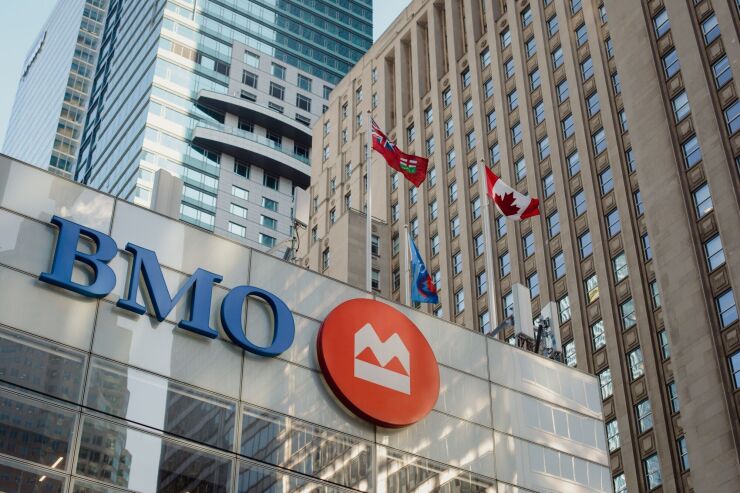- Key insight: BMO Financial, one of the largest Canadian banks, announced plans Thursday to sell some U.S. branches and build others, part of a plan to boost its stateside profitability.
- Supporting data: BMO's plans involve selling about 13.7% of its existing U.S. branch footprint to First Citizens Bank.
- Forward look: The deal is the first large branch-only acquisition amid a current wave of bank M&A.
BMO Financial Group announced a new plan Thursday for its U.S. branch network that involves selling branches in certain regions and opening offices in markets with better growth prospects.
The Toronto-based company, which is trying to boost the profitability of its stateside business, has agreed to sell 138 branches, or about 13.7% of its total U.S. footprint, to First Citizens Bank in Raleigh, North Carolina. The branches are mostly located in the Midwest and Great Plains.
The sale, which needs regulatory approval, marks the first large branch-only acquisition amid
Simultaneously, the $1.4 trillion-asset BMO plans to open 150 new branches in U.S. markets where it can achieve greater density and critical mass. The build-out, which is set to take place over five years, will be focused on California, though new branches will pop up elsewhere.
"We're sharpening our focus on markets with the greatest potential for long-term growth," Aron Levine,
The company did not immediately say how much it will cost to open the new branches.
BMO
The underperformance has been a factor since BMO, one of the four largest Canadian banks, acquired San Francisco-based Bank of the West in 2023. BMO executives have said that the bank didn't capture revenue synergies from that deal as quickly as first anticipated. Meanwhile, ongoing muted loan demand in the U.S. has also been a factor in the bank's performance.
Read more about BMO here:
BMO currently operates 1,006 branches in 23 states, according to data from the Federal Deposit Insurance Corp. In Illinois, where its U.S. operations are based, it has 179 branches. Another 150 are located in Wisconsin, with 68 in Colorado, 65 in Arizona and 54 in Indiana.
California, however, has the most BMO branches, with 227 locations throughout the state.
What it means for First Citizens
The sale announced Thursday involves branches in 11 states — North Dakota, South Dakota, Wyoming, Nebraska, Kansas, Missouri, Oklahoma, and Idaho, as well as certain branches in western Minnesota, one branch in eastern Oregon and one branch in southern Illinois.
As part of the sale terms, $229.4 billion-asset First Citizens will assume approximately $5.7 billion in deposits and purchase about $1.1 billion in loans. A purchase price was not disclosed.
First Citizens currently has 519 branches in 23 states, FDIC data shows.
The company's size has increased significantly in recent years. In 2023, it
On Thursday, the branch deal was described by First Citizens Chairman and CEO Frank Holding Jr. as a way for the bank to accelerate growth in new markets and acquire a "solid" deposit franchise. Additionally, more deposits will contribute to improved liquidity "and provide additional flexibility to support our strategic initiatives," Holding said in a press release.
Read more about bank M&A here:
In a research note, analyst Brian Foran at Truist Securities said the branch agreement would help reduce First Citizens' loan-to-deposit ratio, which was elevated after the SVB acquisition.
The deal "shows [First Citizens] can be creative in doing deals," Foran said in a research note.
Still, he wondered about the branch map, saying that the First Citizens franchise "is kind of three disparate businesses" — a Carolinas community bank, the national commercial lending bank and venture capital banking — that will now be adding branches in all of these other states.
"We're in a digital world, so branch maps don't matter as much as they used to," Foran wrote. "Still, it will feed into some investors' perception that this is more a financial holding company than it is a typical bank franchise."






